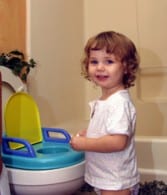Most parents prefer gradually training their babies over several weeks or months and progressing at baby’s own rate. Some, however, would rather plunge right into an intensive course during the weekend or on vacation. A crash course in toilet training does work for certain parent-child pairs, but we don’t advise this method for all babies. Some babies resist being pushed out of diapers too quickly; others welcome help to master their body. The quick method is the same as the gradual method, just more concentrated.
BEFORE-GAME WARM-UP
Select the right candidate. Only babies who are verbal, in a positive and receptive stage, and have a want-to-please attitude toward their trainers are suitable for this fast track.
Concentrate on the game. Approach this as a weekend of intensely relating with your baby, not as a contest, but as a game. You will be with your baby constantly during the waking hours, watching your child’s every move for bowel and bladder signals. Shelve all other commitments. This is a private training session not open to the public.
Select the right season. Just as you don’t schedule basketball games in midwinter, don’t set P-day when baby is in a negative stage. Choose good mood weather, and you can always end the game if a bad mood prevails.
Schedule the game ahead of time. The day before, announce to baby that tomorrow is a special day: “We are going to play a special game,” and repeat “special game” over and over during that day. (You will notice that we use the word “special” as one of our marketing tools. It works, perhaps because it has a special ring to it.)
Hold a pregame warm-up. Continue to emphasize that this is a special day and that you are going to do something special today: “We are going to play the game of no-more-diapers and use the toilet like mommy and daddy do.” Throw in “like brother Jim” as an added incentive. Let baby catch your excitement. Babies get excited about what we get excited about.
Select the right uniform. Best is baby’s birthday suit, weather permitting, otherwise a long, loose shirt. No diapers, please. Show baby the training pants-his “special pants.” Show him how to put on the special pants and how to push them down and pull them up.
Publicize this event. Take pictures, preferably Polaroid, and show them to your baby. Demonstrate the push-down and pull-up maneuver in front of a mirror. All the while, keep a game-like atmosphere. If baby periodically loses interest or protests, take time out for a snack break.
Hand out the equipment. Bring out “special prizes.” Like handing out party prizes, one by one unveil the tools of the trade: potty-chair (that you and baby picked out together at the store and kept in a box until P-day), a doll that wets, training pants, and reward stickers or other prizes.
PRACTICE DRILLS AND TOILET TRAINING AIDS
The sitting drill. Practice sitting on the potty-chair “just like mommy and daddy.” Put the potty-chair next to yours and sit together and chat awhile.
Instruction manuals. As you’re sitting on your respective potty- chairs, read a picture book about potty training.
Getting-on-potty-chair-and-what-to-do-there drill. Let him watch you (for real or just pretending)-an enthusiastic grunting sound can give him the idea.
A practice dummy. Go through the drill with a doll that wets, explaining each step of having the doll wet: removing pants, changing the doll, and emptying the potty-chair bowl into the toilet.
PLAY BEGINS
Meanwhile you have already scouted your star player and you know his moves. Squatting tells you it’s BM time; clutching the front of the diaper (or where the diaper used to be) or looking down there is the about-to-wet signal. Watch for the player’s signal. At the first squat, interject a “go potty” as you direct him toward the potty-chair, which is either on the kitchen floor or in the bathroom next to your toilet. Shadow baby all day issuing reminders of “go potty” at each about-to-go signal. Keep potty hair in a central location. Repetition of the association between baby’s about-to-go signals and your “go potty” cues helps baby make the connection: “When I get the urge, I go to the potty.”
REWARDS WHEN TOILET TRAINING
If baby consistently makes the right moves during the first day, chalk this up as beginner’s luck. Also, expect many false starts as baby learns that he can get mommy or daddy to come running at every squat. When you make the right call and take baby to the potty or, even better, he runs to the potty before he has to go and does his thing, reward him with a surprise. One mother who used this fast-track training successfully put reward stickers on the back of the potty- chair for each go.
CALL THE GAME AT NIGHT
Don’t expect nights free of diapering until several weeks after daytime training has been successful. And you’re still in the right ballpark if your child needs nighttime diapers for many months, or even years, after day training is achieved
If this crash course isn’t working, don’t feel that you’re a failure as a teacher or demote the pupil. You may have a casual kid who needs a casual approach. The need for diapers does pass.

